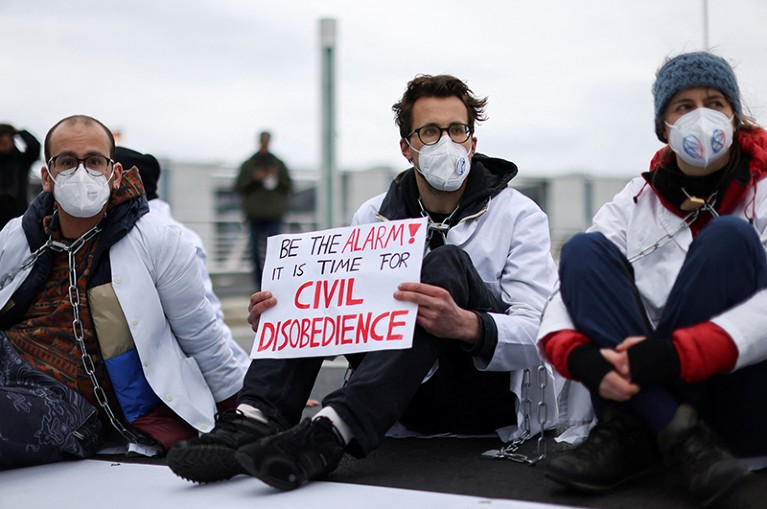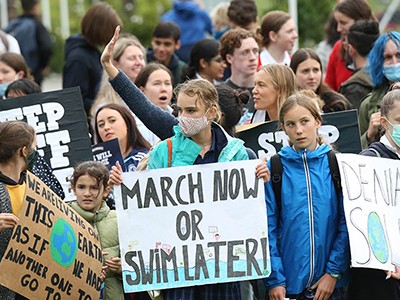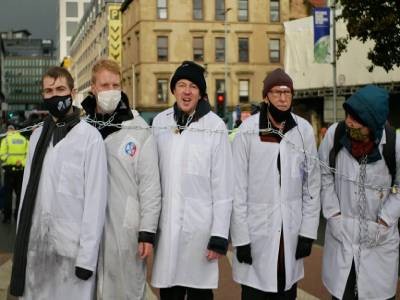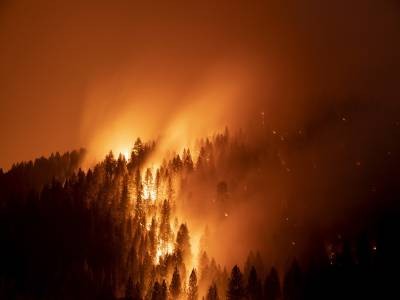
Researchers have increasingly taken up activism in the face of the climate crisis.Credit: Christian Mang/Reuters
More than 2,000 researchers from around the world have signed a letter asking the American Geophysical Union (AGU) to reverse actions it took against two scientists who briefly protested at its annual meeting in Chicago, Illinois, in December. The scientists had urged their fellow attendees to speak out about the climate crisis. The demonstration was minor, the letter says, and it is scientists’ responsibility to speak up about global warming.
Young people’s climate anxiety revealed in landmark survey
The episode resurfaces a long-standing debate about whether climate scientists should engage in activism — and raises new questions about whether their careers will be threatened if they do.
On 15 December 2022, Rose Abramoff, an Earth scientist then at Oak Ridge National Laboratory in Tennessee, and Peter Kalmus, a climate scientist at NASA’s Jet Propulsion Laboratory (JPL) in Pasadena, California, walked on stage at the beginning of an AGU plenary talk and held up a banner reading “Out of the lab & into the streets”. Moments later, the organizers of the session took away the sign and asked them to leave, which they did.
In response to the protest, the AGU removed the scientists’ abstracts from the meeting programme, expelled them from the meeting and opened cases of professional misconduct against them. The cases are still ongoing. In January, Abramoff was fired from Oak Ridge as a result of the incident. Kalmus still works at JPL, but declined to tell Nature whether officials there had reprimanded him.
Climate scientists are becoming more and more frustrated by what they view as a lack of action from governments and institutions to curb emissions, so it makes sense that they would choose activism, says Almut Arneth, a biologist at the Karlsruhe Institute of Technology in Germany who signed the letter. The AGU’s response is disproportionate to a non-violent protest, she adds. “We need to make sure that we as scientists are stepping up to stop something that could potentially be quite dangerous for free speech in science.”

Kalmus and Abramoff protest on stage at the AGU meeting in December.Credit: Dwight Owens
In particular, many younger researchers see themselves as being most at risk from climate change, and so are increasingly turning to activism. The society’s actions in this case set a precedent that could be especially damaging for early-career scientists such as Abramoff, and other researchers in positions without substantial power, says Ana Bastos, a geophysicist at the Max Planck Institute for Biochemistry in Jena, Germany, who signed the letter. “They might fear for their careers, for their jobs, for their future if they want to become politically engaged.”
The AGU, which has 60,000 members who include Earth and space scientists, declined to answer Nature’s questions because of the ongoing investigations. But a spokesperson said that the society’s ethics policy and meetings code of conduct require “attendees to treat everyone with respect, and this includes respecting presenters’ time to speak and audiences’ time to listen”.
The spokesperson also said that the society provides opportunities for people “year round” to reserve space for public engagement at all its meetings, and has a proactive stance on “aggressively” addressing the urgency of climate change.
Civil disobedience
This wasn’t the first time that Abramoff and Kalmus had protested to demand action on climate change. Both had even been arrested for civil disobedience. For instance, they were detained last November after chaining themselves to the fence of Charlotte Douglas International Airport in North Carolina to protest against emissions from private jets, as part of global demonstrations organized by the activist group Scientist Rebellion.
Scientist Rebellion: researchers join protesters at COP26
Because the climate crisis is so dire, Abramoff says, she is willing to be arrested or fired to fight it — but she wasn’t expecting that to happen as a result of the AGU meeting. “I was surprised. And I was sad, because I really enjoyed working at the laboratory.”
According to a 10 January opinion piece that Abramoff wrote for The New York Times, Oak Ridge fired her because, it said, she had misused government resources by engaging in a personal activity on a work trip, and she hadn’t adhered to its code of business ethics and conduct.
A spokesperson for Oak Ridge declined to answer Nature’s queries about why it had fired Abramoff, except to say that the lab respects the rights of all employees to pursue their personal interests outside work.
Impartial observers no more
Nature polled more than 200 climate scientists in 2021 about activism and other issues. One-quarter said they had participated in climate demonstrations, and two-thirds said they engage in climate advocacy. Aaron Thierry, an ecologist at Cardiff University, UK, says that evidence about global warming has been ignored for decades, so civil disobedience is a natural next step for scientists seeking to effect change.
Top climate scientists are sceptical that nations will rein in global warming
In the past, scientists have been reluctant to raise their voices in case activism compromised their image as unbiased gatherers of data and called into question the legitimacy of their work, Thierry says. But climate scientists can no longer be impartial observers, he adds.
“We are going to be affected by the consequences of climate change as citizens and as individuals,” he says. Taking action “doesn’t make us bad scientists, it doesn’t undermine the work that we do. If anything, I think, it makes us better scientists, because it means that we’re engaging with our work and what it means to society.” To Thierry, the AGU’s response is terrifying because it’s a step backwards from what the climate crisis requires.
Making room for debate
As a society that represents a large portion of the climate-change-research community, Abramoff says, the AGU could have used the protest as an opportunity to embrace the debate over activism and make room to discuss it. Organizers could have said, “Well, you know, we’ve got a situation here, we don’t know how to deal with it — why not set aside a panel discussion at the next meeting?” she says.
Why young climate activists have captured the world’s attention
Some policymakers are asking similar questions. In response to the sanctions against Abramoff and Kalmus, US senator Edward Markey (Democrat, Massachusetts) wrote to the AGU asking for an explanation. The society awards a monetary prize to scientists who engage in climate communication, he wrote. So “it is as baffling as it is disappointing that AGU apparently paired its important efforts to promote global understanding of climate change with efforts to suppress actions taken in furtherance of it”.
The AGU says it will issue a report on its investigations concerning Abramoff and Kalmus on 17 February.





